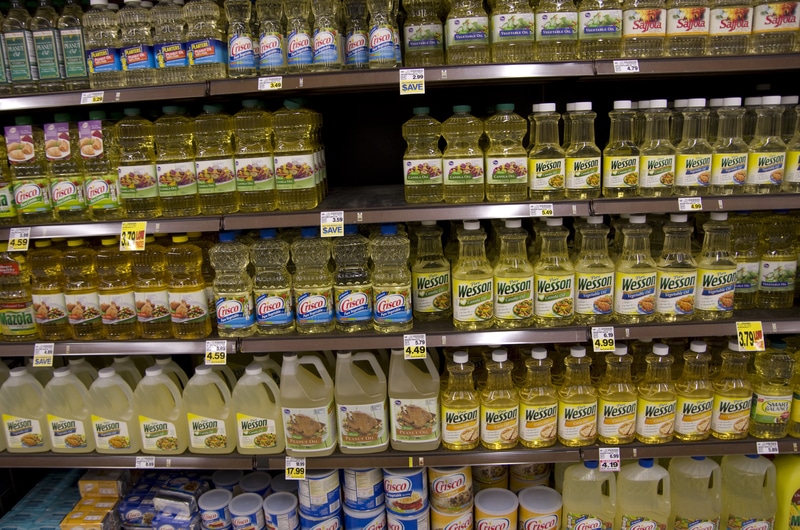Canola Oil Controversy: Is Canola Oil Bad For You?
Canola oil is highly controversial these days. Once beloved by all and used for many a boxed cake mix, it’s now avoided like the plague. Its bad reputation seems to have come out of nowhere, but is it deserved? Is canola oil bad for you? And is canola oil inflammatory? In this article, I’ll address these questions and more, including GMOs and the processing of canola oil.
(super brief) history of canola oil
What is “canola”, exactly? It all starts with the rapeseed plant – a pretty, yellow flowering plant. The rapeseed plant has a very oil-rich seed but also contains high levels of erucic acid – a compound that in large amounts can be toxic to humans.
So, in the 1970s, Canadian scientists set out to create a variety of the rapeseed plant with very low levels of this compound, which they named the canola plant. The name canola came from combining the words “Canada” and “ola” (for oil).
Photo by Denes Kozma on Unsplash
Is canola oil genetically modified?
Although the original canola plant was created through traditional plant cross-breeding – not considered genetic engineering – fast forward to the present and about 90% of the canola crops grown in the United States are genetically modified (aka GMOs). They have been genetically modified to improve oil quality and increase herbicide tolerance and pest resistance. And this, my friends, is where the bad press on canola oil begins.
A proper discussion on GMOs warrants more than the short paragraph I can dedicate to it in this post. What I will say is that major health groups, including the World Health Organization, support that genetically modified foods are safe. There is no data to indicate that consumption of them is bad for human health.
But if you are genuinely concerned about GMOs, that does not mean you have to avoid all canola oil. By definition, organic crops cannot be GMOs. So, while the vast majority of canola oil in the US is GMO, if you buy organic canola oil, it will not be.
In any case, the oil, whether the canola seed it comes from is genetically modified or not, is the exact same. Speaking of which…
Canola Oil Nutrition Facts
One tablespoon of canola oil provides about 120 calories and very few vitamins or minerals (aside from vitamins E and K), which is typical of most fats and oils.
Canola oil is a good source of vitamin E, providing about 16% of the recommended daily intake of vitamin E for adults per tablespoon. Vitamin E functions as an antioxidant and plays a central role in supporting the immune system.
Fat content of canola oil
Canola oil has a favorable fatty acid profile. It has the least amount of saturated fat of all the oils (including olive oil), and over half of its fat content is made up of the monounsaturated fatty acid (MUFA) oleic acid – the main kind of heart-healthy fat found in avocados.
The remaining fat content is made up of polyunsaturated fatty acids (PUFA) linoleic acid (an omega-6 fatty acid) and alpha-linolenic acid (an omega-3 fatty acid).
There is about twice as much omega-6 as omega-3 fatty acids in canola oil. Although this two-to-one ratio is nutritionally ideal, the simple fact that canola oil is high in omega-6 fatty acids has led many to believe that canola oil is inflammatory.
Does canola oil cause inflammation?
Of your polyunsaturated fatty acids, omega-3’s get the sunny reputation whereas omega-6’s are often blamed for causing inflammation. Rest assured, the bad press on omega-6 fatty acids seems to be as overblown as the bad press on canola oil.
Like omega-3’s, omega-6 fatty acids are essential – meaning the human body can’t make them and so they must be obtained from the diet. They play important roles in the body and can help lower “bad” cholesterol (aka LDL-cholesterol) levels. However, critics argue that intake of omega-6s, particularly the ratio of omega-6 to omega-3 intake, is too high in the typical Western diet. Although a high ratio of omega-6 to omega-3 intake has been associated with weight gain and increased inflammation, the evidence to date from human studies does not support that omega-6’s are to blame.
The top sources of omega-6 fatty acids in the typical Western diet are canola oil and other vegetable oils, which are often found in foods that are high in calories, total fat (including saturated fat), and/or sugar, like fried foods. There is no evidence that moderate consumption of canola oil as part of a balanced diet low in fried and ultra-processed foods is inflammatory.
Plus, many health experts agree that to optimize your ratio of omega-6 to omega-3 intake, you should shift your efforts to eating more omega-3 sources, like fatty fish, not eliminating omega-6 sources.
Is canola oil highly processed?
Most canola oil on the market is refined – meaning they use solvents and heat to extract the oil from the seeds and create a final product with that neutral flavor and light color we all know and love.
There are concerns that trace amounts of the chemical solvent hexane used to extract the oil can be left in the oil. Any amounts left are microscopic (estimated at less than 1 ppm), and there is no evidence of negative health effects from consuming these trace amounts. Plus, most of the hexane you take in on a daily basis doesn’t come from foods – you breathe it in (vehicle fumes being a main contributor).
There are also concerns that when the oil is subjected to very high heat during the final processing step, a very small amount of unsaturated fats are transformed into trans-fats. This can occur in the processing of all vegetable oils, but manufacturers have come a long way with this process over time to minimize this.
There’s no denying that the refining process somewhat reduces the amounts of good-for-you nutrients in the final product, like omega-3’s, vitamin E and other antioxidants. An unrefined canola oil that does not use hexane or high heat does exist, called cold-pressed canola oil. It has a more noticeable flavor and darker color and retains more of these nutrients, but it is very expensive and difficult to find.
Is canola oil healthy?
The US Food and Drug Administration (FDA) has ruled that canola oil is eligible to bear a formal health claim on its ability to reduce the risk of heart disease due to its unsaturated fat content. The fine print is that the canola oil has to replace an equal amount of saturated fat, and not increase total fat or calories in the diet. There is some evidence that replacing vegetable oils for saturated fat in the diet appears beneficial for reducing LDL-cholesterol levels and reducing cardiovascular disease (CVD) risk and CVD events; however, other evidence suggests that doing so is unlikely to have such effects.
Canola oil may be particularly beneficial for those following a plant-based or vegan diet. As previously mentioned, canola oil is a good source of the omega-3 ALA, found mostly in plant foods. ALA must be converted to one of the other omega-3’s EPA or DHA in the body before it can be used for something other than providing energy. Unfortunately, only a small amount of ALA is converted to EPA or DHA, which is why it’s recommended to include food sources of EPA and DHA in the diet.
EPA and DHA are found primarily in seafood, therefore individuals following plant-based diets depend on ALA-rich foods (like canola oil, flaxseed oil, and seeds) to boost EPA and DHA production.
Is canola oil allowed on the Whole30 plan?
If you haven’t heard of it before, Whole30 is a popular elimination diet that emphasizes whole foods. Canola oil is not recommended for use on Whole30, although the guidelines are a bit flexible with some canola use in order to facilitate eating out or with friends.
Bottom line
The evidence on canola oil doesn’t exactly stack up to the extensive evidence on the cardiovascular benefits of the antioxidant-rich extra-virgin olive oil (EVOO), and for that reason I suggest cooking mostly with EVOO (if it fits your budget and taste preferences).
That said, there’s also no evidence to support that including canola oil in the diet is unsafe, unhealthy, or inflammatory. There appears to be no reason to stress over it being in some of the food products you buy or using it in recipes where a neutral-flavored oil is preferred.
As a registered dietitian, I support and preach variety in all aspects of the diet, including the oils and other fats you consume. So, if you like to use canola oil regularly in your recipes, I recommend alternating it with some others, like EVOO. In addition, be sure to include other healthy fat sources in the diet that are as close to how they’re found in nature, since oils in general shouldn’t be your main and only fat source. Healthy fat sources like nuts, seeds, avocado, and fatty fish offer other things like fiber, protein, vitamins and minerals.









